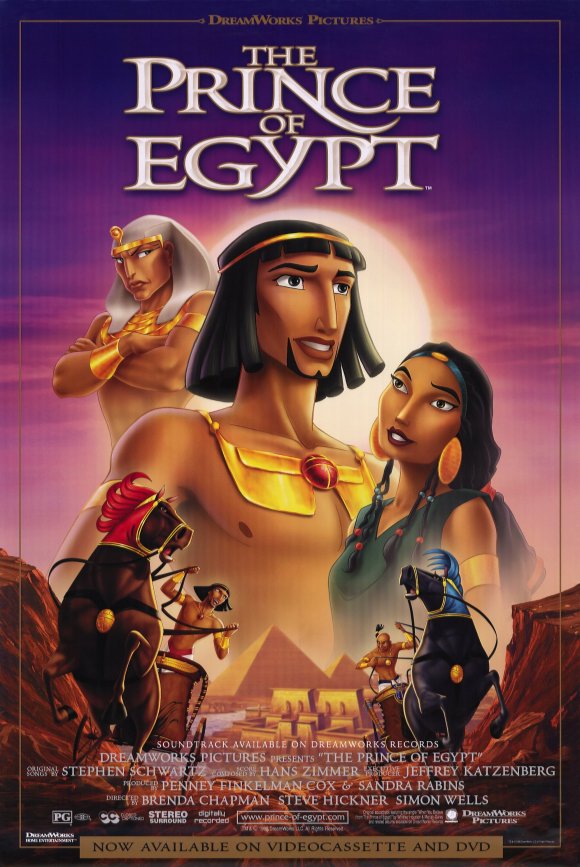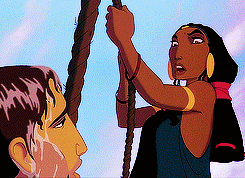SUPERVERSIVE: “Prince of Egypt” is a brilliant Biblical Epic with a Big Black Dot
Tuesday , 27, November 2018 Superversive 12 Comments “Prince of Egypt” is a 1998 animated movie made by Dreamworks back before Dreamworks ruined western animation with “Shrek”*. It is a musical made in a different, more mature and adult style than the Disney renaissance films that were all the rage those days. It is also probably the last great biblical epic ever put to screen, made in an entirely different era than the golden age of those sorts of films (how there has never been a movie made of “Esther” I’ll never understand).
“Prince of Egypt” is a 1998 animated movie made by Dreamworks back before Dreamworks ruined western animation with “Shrek”*. It is a musical made in a different, more mature and adult style than the Disney renaissance films that were all the rage those days. It is also probably the last great biblical epic ever put to screen, made in an entirely different era than the golden age of those sorts of films (how there has never been a movie made of “Esther” I’ll never understand).
The animation of “Prince of Egypt” – save for a janky CGI shot of Moses’s basket floating down the river – is stunning, at times absolutely breathtaking. The score of the movie has gone down in legend. Almost no song misses the mark – the opening number “Deliver Us”, would be one of the greatest openings in cinematic history if not for the aforementioned janky CGI – but as an overall scene it’s breathtaking. The only song that doesn’t work perhaps as well as it should is the Egyptian magicians singing “You’re Playing with the Big Boys Now”, partially because the modern expression feels out of place, but the animation in that scene is so eerie and fantastical it’s a forgivable sin.
The emotional heart of the film comes down to two relationships: Moses’s with Ramses, the Pharaoh at the time of the story, and Moses’s with God. The real coup of the film is the early work they do establishing the relationship between the stepbrothers. This gives the later scenes weight and heart that really helps you empathize with the difficulty of Moses’s situation and with the feelings of betrayal Ramses feels. Those early scenes also do a lot to help you understand why Ramses acts the way he does: Raised from birth to be the leader of a great dynasty, with immense pressure not to be the first weak link in the royal line, and told from the moment he gained the throne that he would be the most important, most powerful person in the world. Is it any wonder he would refuse to listen to a traitor speaking for the God of a slave race?
The scene with Moses and the burning bush is simply awe-inspiring, the voice acting of Val Kilmer selling the weight and emotion of the moment. We can see how somebody raised in Moses’s situation, living with the Egyptian royal family, would be the right person to inspire a race of people.
There are a couple of minor deviations from the Biblical narrative but nothing drastic, and nothing that detracts from the weight and power of the original story.
But the movie drops the ball in one important and depressingly common way, and it can be summed up in two words: Anachronistic feminism. And the way it is introduced into the story is A) Completely unnecessary and B) Utterly moronic.
The first time Moses encounters his wife, Zipporah, she is presented to him as a concubine. But she is a Strong Wymyn. She isn’t scared, nor does she accept and take advantage of what is probably a better fate for her than living in squalor (remember, this would make her a member of the Egyptian noble family!).
Instead, she lashes out and yells and acts, like, super angry, because the Patriarchy is oppressing her. Later she escapes by – I’m not making this up – tying up the guard tasked specifically with holding her. While tied up herself. Moses, when he sees that she escaped, feels a pang of sympathy and distracts the guards long enough for her to leave, which, fine, okay. Moses isn’t quite enlightened but he has enough of an innate moral sense to sympathize with her plight. All right.
 But then when he finds her later after running out in the desert, what does she do when she sees him trapped at the bottom of a well? Does she gasp, pull it up enthusiastically, and with tears in her eyes thank him profusely?
But then when he finds her later after running out in the desert, what does she do when she sees him trapped at the bottom of a well? Does she gasp, pull it up enthusiastically, and with tears in her eyes thank him profusely?
Nope. She drops him back in. Even her family points out how bitchy she’s being.
They of course end up married, making Moses mankind’s first Woke husband.
And I can’t emphasize enough not just how insanely stupid this is, but also how completely unnecessary it is. Taking it out and making Zipporah in some way pleasant would change literally nothing about the story. It’s idiotic.
And it’s the movie’s only serious flaw. There are other nitpicks. Jeff Goldblum as Aaron is miscast and Aaron himself, the spokesperson of Moses, has a major disservice done to him, but as he’s not a major character this is far from egregious. Even outside of the song mentioned above the Egyptian Priests can be hit or miss when it comes to humor.
And…that’s it, really. The movie is amazing. It’s remarkable. It’s gorgeous to look at, the voice acting is almost universally excellent, the soundtrack is magnificent, the writing is sharp. This is not a good, but a great movie.
But, man, that feminist nonsense. It is like someone painted a big black dot in the middle of The Last Supper. The painting is still a masterpiece but you’re always going to lament how good it WOULD have been if that mark was just gone.
Still, this is a must watch movie that does just about everything well, and can justly be called one of the all-time great animated films and, yes, the last great Biblical epic. Just make sure you’re prepared for that big black dot going in. Maybe it’ll help you ignore it.
Which you absolutely should, because in nearly every other way, it’s a masterpiece.
Highly recommended.
*Shrek and its first sequel are very good movies but the trend they set for the industry was very, very bad
The bitchy rescued woman is common and still very much out of place in terms of believable human behavior, but it checks the right boxes with modern sensibilities. See: Princess Leia in Star Wars.
And there was an Esther movie, called One Night with the King. It’s a Christianese movie from a few years ago, so I don’t think it’s very good.
-
And then the only specifically “Zipporah” scene in the Bible is the bit about her refusing to circumcise their son, and Moses not bringing her up short. Whereupon he becomes deathly ill, and she takes a sharp rock, circumcises the kid, and flings the foreskin at Moses’ feet with the dramatic line, “Surely a bloody husband art thou to me.”
You could probably make a case for a b****y proto-feminist out of that, as long as you didn’t look too close.
(examples of “looking too close”:
–The “sharp rock” was almost certainly a flint knife, in common use for ceremonials and sacrifices long after metal was the thing elsewhere.
–The “bloody husband” thing is nowadays commonly read as “bridegroom of blood” or something of the sort. Implying that whatever she meant, rage at her husband wasn’t the biggest part of it.
–etc.
)
Veggie Tales did an Esther film, if that counts.
There has been an Esther film, but it lost about $6m despite a flash in the pan of popularity with Evangelical women. https://www.imdb.com/title/tt0430431/
“When you Believe” is the terrible song in that movie. It locates the miraculous power not in the Divine but in human desire and effort.
“Who knows what miracles you can achieve
When you believe, somehow you will”
-
It has Gaius Baltar as Haman too. I saw it it wasn’t that bad.
The Dreamworks version of Moses looks like Adam Driver.
One of my favorite parts is the burning bush scene, when Moses descends into a cave and hears the voice of God — that voice being the same as Moses’, with the other voice actors mixed in. It’s a powerful symbolic element.